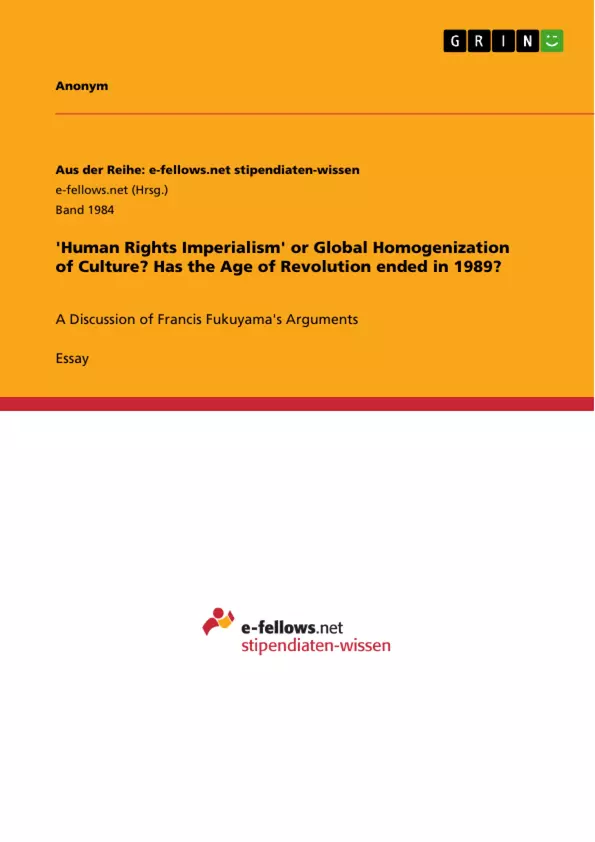After briefly summarizing Fukuyama’s theory, the following essay will attempt to compare and contrast several aspects of his work to Samuel P. Huntington’s 1996 ‘Clash of Civilizations’, in which he strongly opposes Fukuyama’s concept of global homogenization and instead argues in favor of “a multi-polar, civilization-divergent course”. I will then continue to show post- 1989 examples that question today’s salience of Fukuyama’s argument and also comment on the difficulties that we face when trying to define ‘revolution’ in general, invariant terms.
The final question that is open to answer is whether or to what extent those recent events can still be considered ‘revolutions’, if we assume that History has really ended in 1989. Does the term ‘revolution’ necessarily imply directedness towards the establishment of liberal democracy, or can revolutions also occur in another direction? If the end of History means an end of revolution, what does that make the social changes that occurred after?
With the fall of the Berlin Wall and the defeat of communism in Eastern Europe in 1989, “a round of self-congratulations was sparked in the West” as the Western democracies had successfully won the Cold War which further led to the belief in the “universalization of Western liberal democracy” .
200 years after the Great Revolution in France, inspired by secularized enlightenment, managed to end the absolute monarchy of Louis XVI., and paved the way for more democratic governments all throughout Western Europe, Francis Fukuyama proclaimed the end of History, as the world had reached its final destination, “the only coherent political aspiration that spans different religions and cultures around the globe” : liberal democracy.
Further developments in international relations, such as the rise of terrorism or the economic success of China’s authoritarian regime, however, lead to continued discussions about whether liberal democracy can really be considered to be the peak of all civilizations or whether it was simply Western ethnocentrism that led Fukuyama to believe in the superiority of Western values and Western politics. After all, competing ideologies continue to exist today and as the rise in radical anti- Western movements has shown, America’s role in the world remains at best ambiguous.
Table of Contents
- I. Introduction
- II. Summary of Fukuyama's ‘The End of History and the Last Man’
- History vs. history
- Recognition
- Liberal Democracy
- III. Compare and Contrast to Huntington's 'Clash of Civilizations'
- Modernization vs. Westernization and America's Imperial Role
- The Role of the Nation State
- Theory of Revolution
- Alternatives to Liberal Democracy: Confucianism and Islamism
- IV. Post- 1989 Events that Let Us Question Fukuyama's Thesis
- V. Conclusion
Objectives and Key Themes
This essay examines the argument that the fall of communism in 1989 marked the "end of history" and the universalization of Western liberal democracy. It explores the theories of Francis Fukuyama, who argues for a global homogenization towards liberal democracy, and Samuel Huntington, who proposes a "clash of civilizations" instead. The essay aims to analyze the validity of Fukuyama's thesis in light of post-1989 events and explore the complexities of defining "revolution" in a global context.
- The End of History and the Universalization of Liberal Democracy
- Comparison of Fukuyama and Huntington's Theories
- The Role of Westernization and Imperialism
- The Significance of Post-1989 Events
- The Concept and Definition of Revolution
Chapter Summaries
The introduction sets the stage for the essay by outlining the historical context of the "end of history" debate, highlighting the self-congratulatory atmosphere in the West following the Cold War and the belief in the universality of Western liberal democracy. The essay then delves into a summary of Fukuyama's central arguments in his work, "The End of History and the Last Man." This summary explores Fukuyama's concept of "History vs. history," his emphasis on the desire for recognition as a driving force in human history, and his assertion that liberal democracy is the final form of human government. The chapter concludes by examining Fukuyama's belief in the inevitability of worldwide homogenization towards a liberal democratic system due to the pursuit of modernization and economic development.
The third chapter compares and contrasts Fukuyama's theory to Samuel Huntington's "Clash of Civilizations," where Huntington argues against global homogenization and instead predicts a multi-polar, civilization-divergent course. The chapter explores Huntington's views on modernization and Westernization, the role of the nation-state, and the potential for conflict between civilizations. It also analyzes the various alternatives to liberal democracy, such as Confucianism and Islamism, as presented by Huntington.
The fourth chapter examines post-1989 events that challenge Fukuyama's thesis about the "end of history." This chapter analyzes the rise of terrorism, the economic success of authoritarian regimes, and other developments that suggest the continued existence of competing ideologies and the complexity of global political dynamics. The chapter also explores the difficulties in defining "revolution" in a consistent and universal manner, considering whether post-1989 changes can be categorized as revolutions despite the supposed end of history.
Keywords
This essay focuses on key concepts such as liberal democracy, globalization, homogenization, Westernization, imperialism, clash of civilizations, modernization, revolution, and the post-Cold War era. The work also examines the theories of Francis Fukuyama and Samuel Huntington as well as the role of historical progress and the search for recognition in shaping global political landscapes.
- Quote paper
- Anonym (Author), 2015, 'Human Rights Imperialism' or Global Homogenization of Culture? Has the Age of Revolution ended in 1989?, Munich, GRIN Verlag, https://www.grin.com/document/336346



